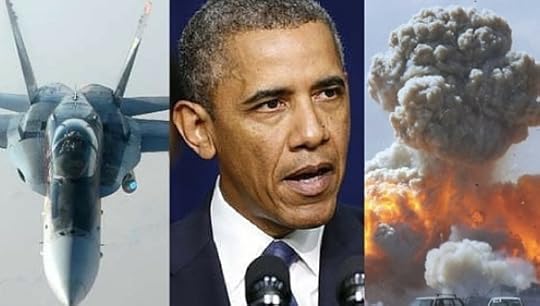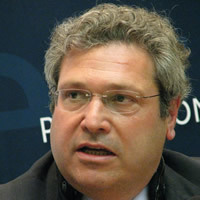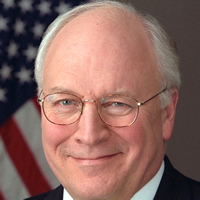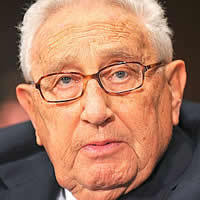David Swanson's Blog, page 43
March 25, 2016
War Is A Lie: David Swanson in Asheville
March 22, 2016
Talk Nation Radio: Paul Engler on THIS IS AN UPRISING
 https://soundcloud.com/davidcnswanson/talk-nation-radio-paul-engler-on-this-is-an-uprising
https://soundcloud.com/davidcnswanson/talk-nation-radio-paul-engler-on-this-is-an-uprising
Paul Engler is founding director of the Center for the Working Poor and one of the founders of Momentum Training. He is co-author of the new book: This Is An Uprising: How Nonviolent Revolt Is Shaping the Twenty-First Century.
Total run time: 29:00
Host: David Swanson.
Producer: David Swanson.
Music by Duke Ellington.
Download from LetsTryDemocracy or Archive.
Pacifica stations can also download from Audioport.
Syndicated by Pacifica Network.
Please encourage your local radio stations to carry this program every week!
Please embed the SoundCloud audio on your own website!
Past Talk Nation Radio shows are all available free and complete at
http://TalkNationRadio.org
and at
https://soundcloud.com/davidcnswanson/tracks
March 21, 2016
David Swanson, TedRall and Harvey Wasserman on KPFK w Lila Garrett
March 19, 2016
U.S. Air Force's Ability to Deliver Death But Not Food Is A Choice
By David Swanson, American Herald Tribune

According to news reports, there are areas of Syria where people are literally starving to death, and where the United Nations is attempting to drop food from the air but missing its target so wildly that the food is damaged or simply cannot be found.
A U.S. Air Force expert on dropping food from great heights in high winds has given what most people will take for a technical comment but which is actually a devastating moral condemnation of U.S. and Western governments' priorities:
"For high-altitude, high-accuracy drops, the U.S. military uses a technology known as the Joint Precision Airdrop System (JPADS), which has been deployed for only about a decade. The system includes a dropsonde, a sort of probe that's dropped prior to the cargo to take readings of wind speed and direction, which it sends to the mission planning software. That data helps planners determine their Computed Air Release Point, or CARP. Once the payload is dropped, onboard actuators and a steerable parafoil canopy help guide the pallet to its target. That's critical, Al says, because a pallet dropped from 20,000 feet will take five or six minutes to reach the ground, and will be subject to wind that entire time. 'It's always windy up high,' Al says. JPADS systems cost about $60,000 apiece and usually must be recovered on the ground after a drop. 'You wouldn't use it for a purely humanitarian drop.'"
Read that last bit again. Because this technology costs $60,000, you would not use it merely to save the lives of human beings. If you were using it to take the lives of human beings, then it would of course be a drop in the bucket of cash you'd be willing to blow, as long as "you" were the U.S. Air Force.
I asked dedicated peace activist Kathy Kelly what she makes of the contrast between the Air Force's claimed ability to blow up a particular individual with a missile from a drone, and its claimed inability to drop food within a mile of a target -- at least without spending money that can't be justified by something as trivial as saving human lives.
"Northrop Grumman spends billions to design spy blimps, drones, persistent threat detection systems and a dizzying array of high-tech surveillance equipment," she said. "Many of these airships hover over , one of the poorest countries in the world, Afghanistan, where the UN reports that 'food insecurity' afflicts over one third of the people. Northrop Grumman executives profit wildly, yet a U.S. government watchdog reported in January of 2016 that 'the Taliban controls more of the country than at any time since U.S. troops invaded in 2001.' Why should U.S. people bamboozle themselves into thinking that funding the so-called defense industry ethically trumps efforts to feed starving people?
"The 2017 DOD budget request also will contain $71.4 billion for military research. On February 2, 2016, Defense Secretary Ashton Carter told the Economic Club of Washington that the Department of Defense budget requests '$7.5 billion for weapons like GPS-guided smart bombs and laser-guided rockets.' One research initiative involves creating 'an arsenal plane that turns one of the military's older planes into a flying launch pad for a range of conventional payloads.' Yes, what if deliveries of food pallets topped the list of 'conventional payloads?' The U.S. could become a beloved country, known for extending a generous hand of friendship and care."
What about unmanned planes, also known as drones? Aren't they supposed to serve some useful purpose while avoiding getting pilots shot down? But don't they mostly buzz so high up they can't be shot, and mostly send missiles screaming into people's houses generating ever more hatred and blowback?
"Drone helicopters could be used to bring food," peace activist Nick Mottern tells me, pointing in particular to the pilotless cargo helicopters from Lockheed Martin being tested in Afghanistan. This approach to saving, rather than "bugsplatting" or "pink misting," human lives, could avoid the problems of high wind altogether by landing the drone helicopters on the ground, full of food.
"Using the drone helicopter for food delivery seems to be a very good idea," says Mottern, "and tactics would have to be developed for situations in which the drone would be under fire. Possibly it could be flown at maximum altitude to over the drop zone and then descend rapidly through the column of air over the zone. Or the helicopter might descend to several hundred feet over the drop zone to reduce exposure to ground fire, drop a specially packaged load and then rise again. The point of maximum vulnerability to ground fire would likely be when the helicopter comes for an instant to a dead stop to drop its load, but there might be a tactic that would enable the machine to keep forward motion while flinging its payload on release. There would probably have to be some special balancing controls installed to let this happen, but it should be possible. The Marines were using the K-Max at night, which might be a good tactic for relief operations."
This would mean risking the expense of significantly more than $60,000, as Mottern recognizes: "Of course the use of the drone helicopter would mean that the owner(s) of the helicopter would be willing to risk having it shot down. Ideally world relief organizations would have fleets of them to be able to make adequate relief drops recognizing that some drone helicopters would be lost."
U.S. television advertisement viewers could be forgiven if they imagine the U.S. military to be a world relief organization. Sadly, the trillion dollars a year that the U.S. government puts into militarism may be famously wasteful and unaudited, but it is very tightly controlled in one particular sense: never shall too big a crumb be expended merely on saving human lives.
March 18, 2016
Obama's Seven Slaughters: It's a Disease, Not a Doctrine
By David Swanson, Telesur

Former Israeli prison guard Jeffrey Goldberg's "The Obama Doctrine" in The Atlantic presents President Barack Obama's view of his own foreign policy (with input from a few of his close subordinates). Obama views himself as a radical leader in military restraint, in brave resistance to war mongers, and in scaling back excessive fear mongering in U.S. culture.
The U.S. President who has overseen the highest Pentagon budget in history, created drone wars, launched wars against the will of Congress, dramatically expanded foreign arms sales and special operations and the arming of proxies, claimed to be "really good at killing people," and openly bragged about having bombed seven nations that are inhabited largely by dark-skinned Muslims, bolsters his "doctrine" by offering accurate antiwar assessments of Nixon, Reagan, and George W. Bush's wars. (He essentially admits to Reagan's October Surprise negotiations with Iran that sabotaged the 1980 U.S. elections.) Obama's and Goldberg's discussion of Obama's own wars does not display the same accuracy or wisdom.
The Goldberg / Obama portrait is shaped largely by the choice of what to include. The primary focus is on Obama's 2013 reversal of his plan to bomb Syria, with a minor emphasis on his negotiation of the Iran nuclear agreement. Much of his more militaristic behavior is completely ignored or brushed aside in passing reference. And even in those cases that come into focus, myths go unquestioned -- even when they are debunked later in this same book-length article.
Goldberg writes as unquestioned fact that "Assad's army had murdered more than 1,400 civilians with Sarin gas" many paragraphs prior to stating that one of Obama's reasons for reversing course on bombing Syria was the CIA's warning that this claim was "not a slam dunk." Goldberg writes that "the strong sentiment inside the Obama administration was that Assad had earned dire punishment." Thus a proposal to drop 500-pound bombs all over Syria, killing countless people, is made respectable in Washington by depicting it as revenge, and nowhere does Goldberg mention oil pipelines, a Russian rivalry, the overthrow of Assad as a step toward Iranian overthrow, or other factors actually at work for which the dubious chemical weapons claims served as an excuse to bomb.
Of course, not bombing was the right thing to do, and Obama deserves praise for it, while Hillary Clinton's publicly stated belief that this was the wrong decision, and John Kerry's continued private advocacy for bombing, are reprehensible. It's also quite valuable that Obama does something rare in this article when he admits that public and Congressional and British opposition to bombing Syria helped prevent him from committing that crime. This is clearly not a false claim but the admission of what is generally denied by U.S. politicians whom even the public cheers for their usual pretense of ignoring polls and protests.
But the public was even more opposed in polls (if less engaged as activists) to arming proxies in Syria. Obama commissioned a CIA report on the past success or failure of such operations, and the CIA admitted there had been no successes (except in 1980s Afghanistan, which involved a bit of well-known blowback). So, Obama chose not, as he puts it, to "do stupid shit," opting instead to do halfway stupid shit, which proved quite predictably to make matters worse, and to make cries for even stupider shit shriller.
In a similar manner, though it goes virtually unmentioned in Goldberg's tome, Obama has launched wars with drones that he has viewed as the exercise of great restraint in comparison to the launching of ground wars. But the drone wars kill large numbers and do so just as indiscriminately, and they contribute to the destabilization of nations just as disastrously. When Obama was holding up Yemen as a model success, some of us were pointing out that the drone war had not replaced some other kind of war but would probably lead to one. Now, Obama, whose "doctrine" claims to have discovered the unimportance of the Middle East (in comparison with the supposed need to build up for wars in the Far East), is dealing unprecedented levels of weapons to Middle Eastern nations, first and foremost to Saudi Arabia. And Obama's military is collaborating in the Saudi bombing of Yemen, which is killing thousands and fueling al Qaeda. Obama, through Goldberg, blames his Saudi policy on "foreign-policy orthodoxy," which somehow "compels" him to do this particular stupid shit -- if that's a sufficiently harsh term for mass murder.
Obama's Only-Do-Halfway-Stupid-Shit doctrine has proven most disastrous where it has succeeded in overthrowing governments, as in Libya. Obama now says that illegally overthrowing the Libyan government "didn't work." But the President pretends, and Goldberg lets him, that the United Nations authorized that action, that the best laid plans were made for after the regime change (in fact, none were), and that Gadaffi was threatening to slaughter civilians in Benghazi. Obama even seems to claim that things would have been even worse somehow without his criminal action. That he's resumed bombing Libya in an effort to fix what he broke by bombing Libya gets the barest mention.
Obama's doctrine has also included tripling down on the stupidest of stupid shit. Through Goldberg he blames the Pentagon for imposing an escalation of troops in Afghanistan on him, though the escalation he has in mind is clearly the second one he oversaw, not the first, the one that tripled the war he'd inherited, not the one that doubled it and which he'd promised as a candidate for the presidency. When military commanders publicly insisted on that escalation, Obama said nothing. When one of them made some minor rude comments to Rolling Stone, in contrast, Obama fired him.
Obama laughably claims to be an internationalist (in part, he brags, because he's forced other countries to buy more weapons). This is the same Obama whose abuse of the U.N. in attacking Libya finally moved China and Russia to block a similar attempt on Syria. Obama even claims that he backed off bombing Syria in 2013 because the U.S. Constitution gives Congress the power of war. This is the same Obama who has since been bombing Syria and who told Congress in his final State of the Union speech that he'd wage wars with or without them -- as he's done in Libya, Somalia, Pakistan, Iraq, etc. Goldberg even quotes an "expert" characterizing the Obama doctrine as "spending less" despite Obama's increases in military spending.
Goldberg's Obama uses the military primarily for human rights, supported the uprising of the Arab Spring, and has developed a very sage and serious approach to ISIS based on his analysis of a Batman movie. ISIS, in Goldberg's telling, was created by the Saudis and Gulf states plus Assad, with no mention of the U.S. role in destroying Iraq or arming Syrian rebels. In fact, Obama, through Goldberg, restates the imperial view that backward Middle Easterners suffer from millennia-old tribalism, while the United States brings humanitarian services to all it touches. In Obama-Goldberg history, Russia invaded Crimea, only the threat of war made Syria give up its chemical weapons, and Rwanda was a missed opportunity for war, not the result of U.S.-backed war and assassination.
"Sometimes you have to take a life to save even more lives," says Obama confidant John Brennan, pushing the drone propaganda also found in the film, Eye in the Sky. Facts are apparently irrelevant to a portrait of a president. Obama, who signed an executive order last year ridiculously declaring Venezuela to be a national security threat tells Goldberg that he wisely came into office in 2009 and squashed any silly idea that Venezuela was any kind of threat. Goldberg's Obama is a peacemaker with Russia whose weapons build-up on Russia's border goes unmentioned, as does the coup in Ukraine, even as Obama packs insults of Vladimir Putin into this article.
The fact is that Barack Obama has slaughtered human beings with missiles and bombs in Afghanistan, Iraq, Pakistan, Syria, Libya, Yemen, and Somalia -- and every one of those places is worse off for it. He's passing his successor greater war-making powers than ever possessed by any previous member of the human species. The unquestioned assumptions of his doctrine look more like a disease. There's little an American president could do to make things better in the Middle East, he says, never stopping to consider the possibility of halting arms shipments, stopping the bombings, grounding the drones, ceasing the overthrows, dropping support for dictators, withdrawing troops, paying reparations, giving aid, shifting to green energy, and treating others with respectful cooperation. Those sorts of things just don't qualify as a doctrine in Washington, D.C.
Audio: me on KBOO talking #Superdelegates
March 17, 2016
Hillary Is A Neocon
She has the record and the vision
 "For this former Republican, and perhaps for others, the only choice will be to vote for Hillary Clinton. The party cannot be saved, but the country still can be." —Robert Kagan
"For this former Republican, and perhaps for others, the only choice will be to vote for Hillary Clinton. The party cannot be saved, but the country still can be." —Robert Kagan
 "I have a sense that she's one of the more competent members of the current administration and it would be interesting to speculate about how she might perform were she to be president." —Dick Cheney
"I have a sense that she's one of the more competent members of the current administration and it would be interesting to speculate about how she might perform were she to be president." —Dick Cheney
 "I've known her for many years now, and I respect her intellect. And she ran the State Department in the most effective way that I've ever seen." —Henry Kissinger
"I've known her for many years now, and I respect her intellect. And she ran the State Department in the most effective way that I've ever seen." —Henry Kissinger
Nobody Beats This Record
She says President Obama was wrong not to launch missile strikes on Syria in 2013.
She pushed hard for the overthrow of Qadaffi in 2011.
She supported the coup government in Honduras in 2009.
She has backed escalation and prolongation of war in Afghanistan.
She voted for the 2003 invasion of Iraq.
She skillfully promoted the White House justification for the war on Iraq.
She does not hesitate to back the use of drones for targeted killing.
She has consistently backed the military initiatives of Israel.
She was not ashamed to laugh at the killing of Qadaffi.
She has not hesitated to warn that she could obliterate Iran.
She is not afraid to antagonize Russia.
She helped facilitate a military coup in Ukraine.
She has the financial support of the arms makers and many of their foreign customers.
She waived restrictions at the State Department on selling weapons to Saudi Arabia, Algeria, Kuwait, United Arab Emirates, Oman, and Qatar, all states wise enough to donate to the Clinton Foundation.
She supported President Bill Clinton's wars and the power of the president to make war without Congress.
She has advocated for arming fighters in Syria.
She supported a surge in Iraq even before President Bush did.

Further Reading
Neocon Kagan Endorses Hillary Clinton.
Dick Cheney Heaps Praise on Hillary Clinton.
Kissinger: Clinton "Effective" at State.
Wall St. Republicans' Dark Secret.
Hillary Clinton and the Weaponization of the State Department.
Clinton Foundation Donors Got Weapons Deals From Hillary Clinton's State Department.
The Left Ought to Worry About Hillary Clinton, Hawk and Militarist, in 2016.
Hillary Clinton Pitched Iraq As "A Business Opportunity" For US Corporations.
For Hillary Clinton and Boeing, a Beneficial Relationship.
On the NSA, Hillary Clinton Is Either a Fool or a Liar.
Harper’s Magazine urges readers to ‘Stop Hillary! Vote No’.
Videos
http://hillaryisaneocon.com/node/3
https://www.facebook.com/hillaryisaneocon
https://twitter.com/Hillary_Neocon
Take Action
Come Clean
Tell Hillary Clinton to Stop Lying About Her Iraq Vote.
Promote Democracy Without Bombs
Demand Democratic Superdelegates Represent Their Constituents at the National Convention.
Kick the War Habit
Know anybody who just doesn't get it? Forward this to them!
March 16, 2016
What No One in the Media Has Asked the Candidates About War
If you can get presidential candidates in the Democratic or Republican parties to answer any of these, please let me know.
1. President Obama's 2017 budget proposal, according to the National Priorities Project, devotes 54% of discretionary spending (or $622.6 billion) to militarism. This figure does not include care for veterans or debt payments on past military spending. Is the percentage of discretionary spending now devoted to militarism, as compared to what you would propose for 2018,
_______too high,
_______too low,
_______just right.
Approximately what level would you propose? ______________________.
2. The United States budgets approximately $25 billion per year for non-military foreign aid, which is less per capita or in relation to the nation's economy than many other countries. Is the percentage of discretionary spending now devoted to non-military foreign aid, as compared to what you would propose for 2018,
_______too high,
_______too low,
_______just right.
Approximately what level would you propose? ______________________.
3. Does the Kellogg-Briand Pact forbid war? _____________________.
4. Does the United Nations Charter forbid war that is neither actually defensive nor authorized by the United Nations Security Council? _________________.
5. Does the U.S. Constitution require a Congressional declaration of war? __________________.
6. Do the anti-torture and war crimes statutes in the U.S. code ban torture? _________________.
7. Does the U.S. Constitution forbid imprisoning people without charge or trial? ________________.
8. The United States is the leading weapons supplier, through sales and gifts, to the Middle East, as to the world. In what ways would you reduce this arms trade?_______________________ _________________ ______________________ _________________________ _________________________ ___________________ _________________ _________________ ____________________.
9. Does the U.S. president have the legal authority to kill people with missiles from drones or manned airplanes or by any other means? Where does that legal authority originate? _____________ ____________ __________ ___________________ _________________ ______________ ___________________ __________________.
10. The United States military has troops in at least 175 countries. Some 800 bases house hundreds of thousands of U.S. troops in some 70 foreign nations, not including numerous "trainers" and participants in "non-permanent" exercises that last indefinitely, at a cost over $100 billion a year. Is this,
_____ too many,
_____ too few,
_____ just right.
What level would be appropriate? ___________ ________________ ________________ _______________ ____________.
11. Would you end U.S. war making in
_____ Afghanistan
_____ Iraq
_____ Syria
_____ Libya
_____ Somalia
_____ Pakistan
_____ Yemen
12. Does the Nuclear Nonproliferation Treaty require the United States to pursue negotiations in good faith on effective measures relating to cessation of the nuclear arms race at an early date and to nuclear disarmament, and on a treaty on general and complete disarmament under strict and effective international control? ________.
13. Would you sign and encourage ratification of,
________ the Rome Statute of the International Criminal Court
________ the Convention on the Prohibition of the Use, Stockpiling, Production and Transfer of Anti-Personnel Mines and on Their Destruction
________ the Convention on Cluster Munitions
________ the Convention on the Non-Applicability of Statutory Limitations to War Crimes and Crimes Against Humanity
________ the Optional Protocol to the Convention Against Torture
________ the International Convention for the Protection of All Persons from Enforced Disappearance
________ the proposed treaty on Prevention of an Arms Race in Outer Space
14. Should the U.S. government continue to subsidize
______ fossil fuels
______ nuclear energy
15. How, and how much, would you propose to invest in bringing renewable, green, non-nuclear energy to the United States and the world? ______________ _______________ _____________ ________________ _____________ ________________ ____________ ______________ ___________________ _________________.
Secession, Trump, and the Avoidability of Civil War
The Governor of California has joked about building a wall all the way around his state if Donald Trump becomes president of the other 49. Secession would not be a joke had it not been given an undeserved bad name. It would not have that bad name but for our universal acceptance of imperialism and of an overly simplistic history of the U.S. Civil War.
Slavery in the U.S. South was widespread through World War II, Jim Crow through the 1960s, mass incarceration through the current day, and bitterness over the Civil War for the foreseeable future. Had the U.S. avoided civil war through a compromise that restricted slavery to existing slave states, or even through a compromise that allowed its possible expansion, or through simply allowing states to secede without war, the net result might have been good or bad. A few things are certain. The bitterness over the war would not exist, the 700,000 killed and many more injured and the incredible destruction of burned cities and fields would not have happened, and war would not have been glorified during the childhoods of the generation that would launch global U.S. imperialism at the dawn of the 20th century.
Very likely, in addition, slavery would have ended more quickly and more thoroughly than it did. Of course, that cannot be stated with certainty. But a nation half-slave, half-free that sought to work through problems without war would have very likely ended slavery through some form of compensated emancipation fairly quickly, bringing up the rear in a global process of liberation. Two or more smaller nations that sought to avoid war would have very likely also put an end to slavery in the one or more nations maintaining it, in part because of international and economic forces and the absence of a fugitive slave law, but also because smaller nations, all else equal, have an easier time achieving democracy. If we had smaller nations on this continent now, or if we were to choose to in the future, we would see the ability of people to bring popular pressure to bear on the governments soar.
Of course, it's anything but an easy moral question whether 4 million people should be left enslaved another moment, or whether a nation should launch a war that might benefit them, though in the end it actually brought very limited and short-lived gains along with 700,000 killed and numerous disastrous results for decades to come. Not only are the results known only after the war, but the moral question has been invented after the war. Many in the North did not want a war to free slaves. A draft had to finally be created, as in the South as well, to compel people to kill and die. And those in power in Washington, including President-elect Lincoln, did not want war to free the slaves, only to prevent the expansion of slavery westward. When the South would not agree to restricting slavery to its current boundaries, Northern decision makers chose to launch a war over "union" -- preferring slaughter to permitting the South, or some part of it, to leave.
Mark Tooley has published a book called The Peace That Almost Was: The Forgotten Story of the 1861 Washington Peace Conference and the Final Attempt to Avert the Civil War. It may remain a forgotten story for at least four reasons that leap out at me. First, Tooley adds in so much gossip-column fluff on clothes and parties and families and churches that it's almost physically impossible to make it through his book if you're looking only for what happened at the conference; this is truly a shame in a culture that already considers peace boring and war exciting. Second, Tooley concludes that the war was "inevitable" anyway, so why should you care? (And why did he give his book the title he did?) Third, Tooley almost completely overlooks the possibility that was most open to the North, namely allowing the South to leave in peace. Fourth, if you look into the details and consider how easily peace might have been chosen instead of war, you may feel a bit of discomfort in your mind. You may come up against the fact that many nations did end slavery without a civil war, and then have to start questioning whether in fact lots of other wars have also been "inevitable."
A strong case could be made that the peace conference was begun too late. Seven states had already seceded. A conference on peaceful secession before secession, or a conference on a slavery compromise before secession, would have been easier. Oh and, by the way, the entire topic of the conference was slavery, not some other vague cause of "states rights" or anything of the sort. Nonetheless, the conference had numerous chances to reach an agreement, and in the end did reach an agreement -- which Congress tossed aside in favor of war, and which Congress was assisted in tossing aside by some members of the peace conference who quickly badmouthed what they had done and opted for war. Among the latter was former U.S. President John Tyler who had chaired the peace conference before returning to Virginia and denouncing it.
Under consideration at the conference was not primarily slavery in the slave states, and certainly not ending it through compensated emancipation, as would be done in Washington, D.C., and numerous foreign countries. At issue was principally the expansion of slavery into the expanding western empire. Both sides insisted on imperial expansion to such an extent that it was truly beyond debate. If they'd been somehow made content with the current size of the country, that too could have resolved the dispute and averted war. So, in that peculiar sense, the Civil War was a war of empire. Delegates from both Northern and Southern states (quite a crowd of former senators and justices and the like) tended also to assume that their choices were either union or war, not peaceful division. A greater willingness to accept peaceful separation could also have averted war.
Michigan, Minnesota, and Wisconsin sent no delegates. William Lloyd Garrison urged the desirability of war. Peace conference delegate Roger Baldwin of Connecticut advocated no compromise with slavery. Some Southern delegates urged no compromise with freedom, even while whining about threats to their own rights and comforts without a thought for those of the people enslaved in their states. The peace conference dragged on unpeacefully for 19 days, with Congress and the states holding their breath and holding off on actions.
Delegate Reverdy Johnson of Maryland made a case for compromise to both sides, urging the North to accept the deal of the old Missouri Compromise as preferable to the Dred Scott decision's ruling that slavery could spread north of latitude 36°30'. Southern delegates were intent on not just preserving slavery but expanding it westward. President-elect Lincoln met with the peace conference and made clear that he would never stand for that and would prefer war; he would leave slavery alone where it existed but never allow it to expand.
After all variety of proposals were heard and rejected, ultimately a compromise was reached by the peace conference that reinstated the Missouri Compromise, required a majority of slave-state senators to approve of new territory, prohibited Congressional interference with slavery, banned the importation of enslaved people from abroad, and affirmed fugitive slave laws but also allowed for compensation paid to an owner to make an escaped slave free. Arguably this final agreement and other proposals that were rejected all propped up slavery more than simply allowing secession would have. The Senate and House quickly took up the peace conference agreement and rejected it. This was a Congress now missing any representatives from eight states, another reason why acting sooner might have succeeded.
During the course of the conference, some hints at another possible course were heard. General Winfield Scott said that dividing the country into four countries would be a "lesser evil" than war. Senator Salmon Chase of Ohio said, "The thing to be done is to let the South go." Former Massachusetts Governor George Boutwell said that the union should be kept free of slavery or not kept. (But he warned ominously that the South could try to annex Mexico and other land, and block the North's expansion to the Pacific. Again, it was all about empire.) Former New York Congressman Francis Granger raised the example of letting the South go as an act too cruel to be considered (so beneficial, apparently, was union with the North). George Summers of Virginia proposed a new nation of the border states, letting the Deep South and New England do their own things.
Victory, and thereby top praise in the history books, went to those who wanted war, including those who opposed slavery, those who demanded "union," and those who insisted on expanding slavery far and wide.
But when secession is proposed in the future, we should not be rash in rejecting it. If the North had let the South go way back when, both countries might be much better off today. If, after the Civil War, someone had been able to turn the clock back four years, the North might have been very willing to let the South go. The South might also have been very willing to give up slavery, or at least its expansion westward, without the insanity and horror of a war. Secession may be an improvement on what we've got now. There are only so many immigrants Canada is going to take.
March 15, 2016
Talk Nation Radio: David Cochran on the Abolition of War
 https://soundcloud.com/davidcnswanson/talk-nation-radio-david-cochran-on-the-abolition-of-war
https://soundcloud.com/davidcnswanson/talk-nation-radio-david-cochran-on-the-abolition-of-war
David Carroll Cochran is the author of Catholic Realism and the Abolition of War. He teaches politics and directs the Archbishop Kucera Center for Catholic Intellectual and Spiritual Life at Loras College in Dubuque, Iowa. He discusses how war might be abolished and what sorts of institutions have been abolished already.
Total run time: 29:00
Host: David Swanson.
Producer: David Swanson.
Music by Duke Ellington.
Download from LetsTryDemocracy or Archive.
Pacifica stations can also download from Audioport.
Syndicated by Pacifica Network.
Please encourage your local radio stations to carry this program every week!
Please embed the SoundCloud audio on your own website!
Past Talk Nation Radio shows are all available free and complete at
http://TalkNationRadio.org
and at
https://soundcloud.com/davidcnswanson/tracks



